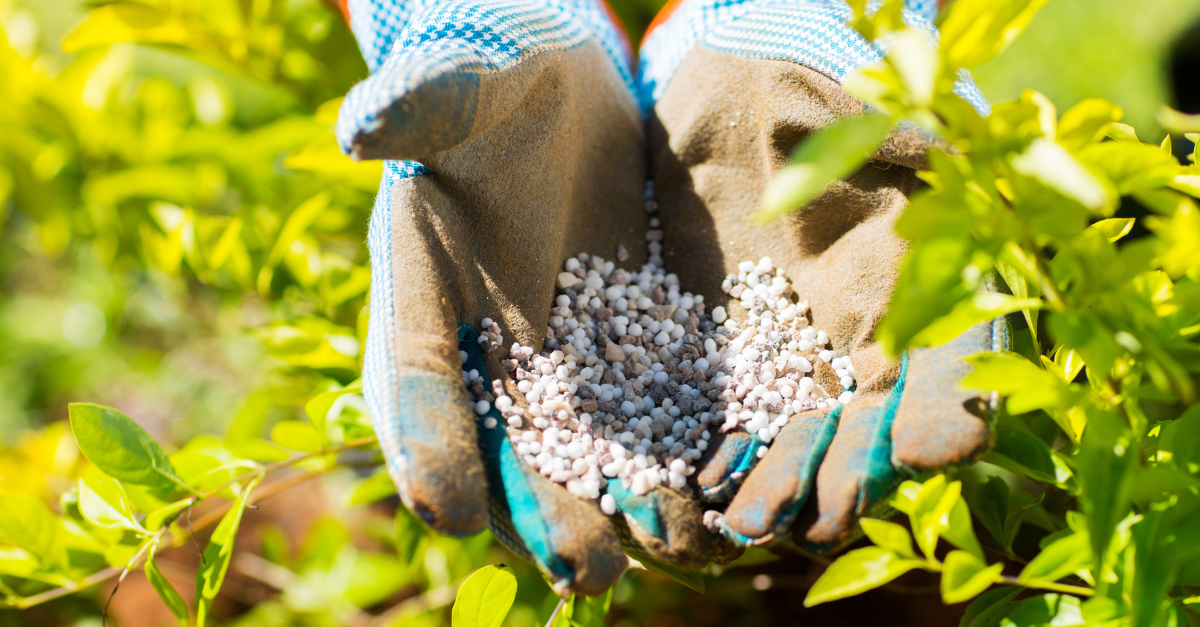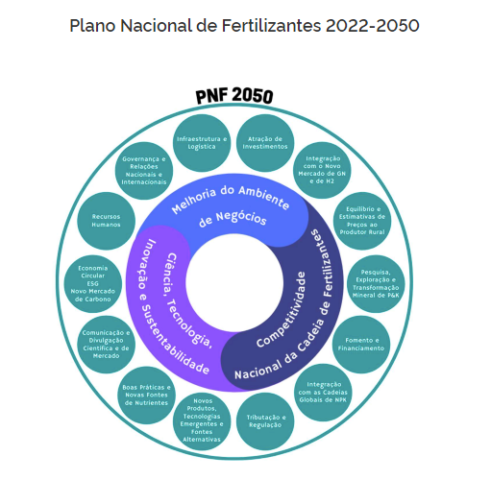
Brazil launches National Fertilizer Plan to reduce input imports
Mar, 11, 2022 Posted by Gabriel MalheirosWeek 202210
Brazil’s strategy to reduce its dependence on fertilizer imports is the National Fertilizer Plan, launched Friday, March 11, at the Brazilian Federal Executive headquarters, known as the Palácio do Planalto. The ceremony was attended by the President of the Republic, Jair Bolsonaro; the Minister of Agriculture, Livestock and Supply, Tereza Cristina; the Minister of Mines and Energy, Bento Albuquerque; the Minister of Economy, Paulo Guedes; and the Special Secretary for Strategic Affairs of the Presidency of the Republic, Flávio Rocha.
The National Fertilizer Plan (PNF) establishes guidelines for the fertilizer sector for the next 28 years (until 2050) in order to promote the development of national agribusiness. Given the complexities of this industry, the PNF focuses on some of the most important links in the productive chain: traditional industry, rural producers, emerging chains, new technologies, mineral inputs, innovation, and environmental sustainability.
This Plan, which began in 2021, was finally formalized by decree on Friday amid global uncertainty. The order also establishes the National Fertilizer and Plant Nutrition Council, a consultative and deliberative body that will coordinate and monitor the National Fertilizer Plan’s implementation.
Currently, Brazil ranks fourth in the world regarding global fertilizer consumption. The most important nutrient used by national producers is potash (38%). Following that, phosphorus ranks second with 33% of the total consumption of fertilizers, and nitrogen, with 29%. Together, these components form what is known as NPK, a widely used formula in rural areas. The crops that used fertilizers the most are soybeans, corn, and sugar cane, accounting for more than 73% of national consumption.
According to the National Association of Fertilizer Diffusion, more than 85% of the fertilizers used in the country are imported, which shows a high level of dependence on a market that only a few suppliers rule. This growing dependence leaves the Brazilian economy vulnerable to fluctuations in the international fertilizer market.
See below a chart of Brazilian fertilizer imports in the last four years:
Brazilian fertilizer imports | Jan-Dec 2018 to 2021 | WTMT
Source: DataLiner (click here to request a demo)
Implementing PNF can minimize the external dependence of these nutrients, which arrive mainly from Russia, China, Canada, Morocco, and Belarus. According to the Ministry of Economic, the United States, Qatar, Israel, Egypt, and Germany complete the list of the ten largest fertilizers exporters to Brazil in 2021.
See below the countries from which Brazil bought most of its fertilizers in the last two years. The data is from DataLiner.
Origins of the fertilizers imported by Brazil | 2021-2020 | WTMT
Source: DataLiner (click here to request a demo)
The PNF seeks to balance national production and imports by meeting the growing demand for fertilizer products and technologies. It is intended to reduce dependence on imports, by 2050, from 85% to 45%, even if the need for fertilizers doubles.
Minister Tereza Cristina explained that the goal is not for the country to achieve self-sufficiency but rather autonomy among national producers. According to her, it is necessary to strengthen “fertilizer diplomacy,” which entails expanding global purchasing relationships for these nutrients.
“We are not seeking self-sufficiency, but rather the ability to overcome challenges and maintain our greatest asset, a thriving and competitive agribusiness that ensures food security for Brazil and the world. Our demand for plant nutrients is proportional to the scale of our agriculture. However, PNF will significantly reduce our reliance on others “, she said, emphasizing that the Plan is intended to address a structural, long-term issue rather than a crisis.
Brazil’s National Fertilizer Plan Objectives
In addition to reducing external dependence, the PNF presents opportunities for emerging products such as organominerals and organic fertilizers (for example, organic fertilizers enriched with minerals) and by-products with agricultural potential, bio-inputs, biomolecules, remineralizing techniques (for example, rock dust), nanomaterials, among others.
The development of technologies suited to the tropical climate in Brazil, as well as the establishment of technological support networks for rural producers and technicians, are part of the Plan and the Caravan Embrapa FertBrasil.
This action, carried out by Embrapa, provides visits to the main agricultural centers. Embrapa’s caravan will have an immediate impact by addressing practical issues related to fertilizer efficiency, reducing up to 20% in the use of fertilizers as soon as the 2022/23 crop. As a result, rural producers will save up to US$ 1 billion.
PNF guidelines also include creating a favorable tax policy for national producers, incentives for private actions, the expansion of installed production capacity, and improvements in national infrastructure and logistics. All of this is being done to boost Brazil’s competitive fertilizer production (fertilizers, correctives, and conditioners).
Economy Minister Paulo Guedes emphasized that the Plan will allow for the expansion of the production chain. “Brazil is a mineral and agro-environmental powerhouse that will, in fact, deepen the production chain from an economic standpoint.”
-
Other Logistics
Oct, 03, 2022
0
Railway proposals under Brazil’s new private ownership program total 89 with BRL 258bn to be invested
-
Ports and Terminals
Jul, 18, 2023
0
Access to Natal Port through Potengi River to be dredged soon
-
Other Cargo
Dec, 09, 2022
0
Cachaça export value in 2022 exceeds the previous twelve-year high
-
Economy
Mar, 24, 2022
0
Exports of items with record values grew in the pandemic




